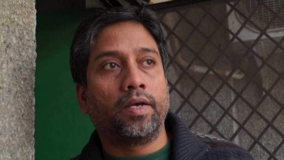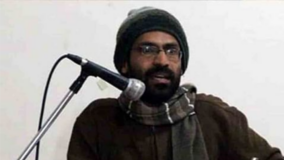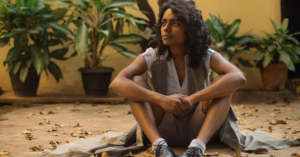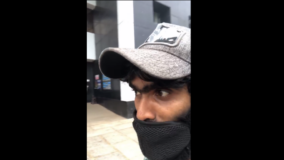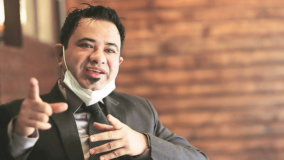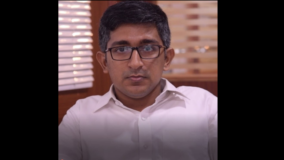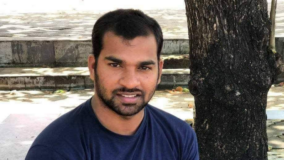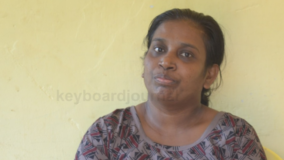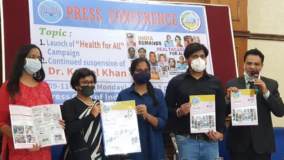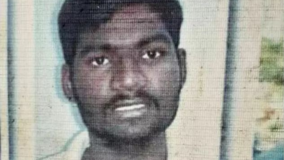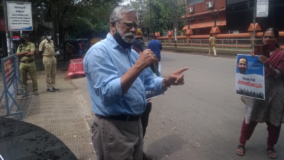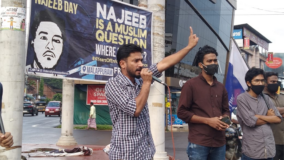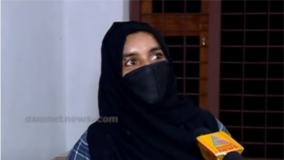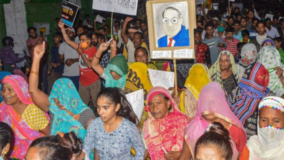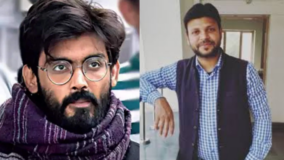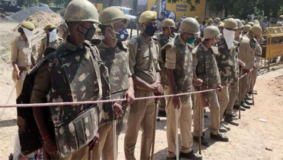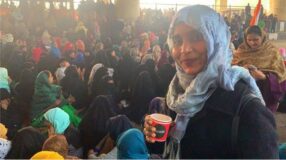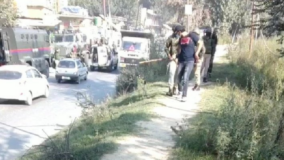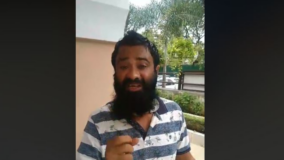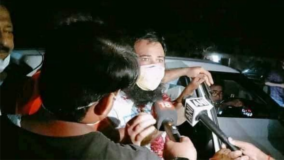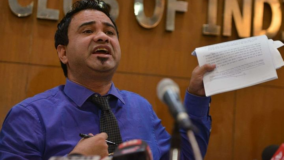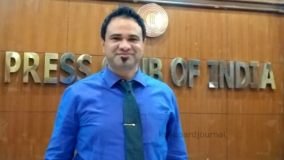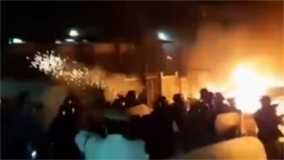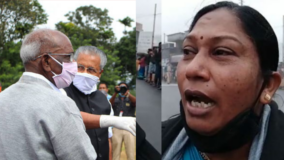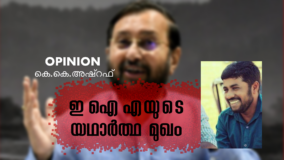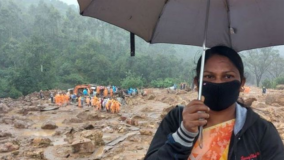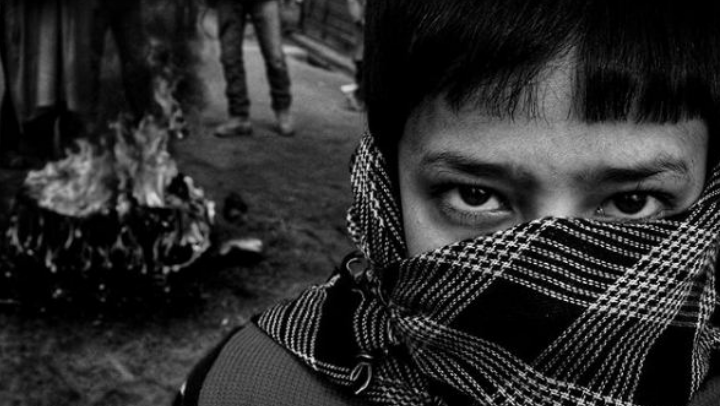
The Remembered Night; Childhood account of army crackdown in Kashmir, by a student
By Tanveer Ahmad Khan
“Surveillance restrain Authors from Writings, so writing is dying”
Long ago, we were residing in a tin-shed house with two rooms and small kitchen. It was too difficult to come out of tin-shed house without candle light or oil lamp. Oil lamp being the only source of light, was used during darkness for dinner as well as for feeding the cattle. It was the month of Chillai-Kalan; the weather was dry and cold;my mother offered me blanket and fire pot for warming. I was just eight years old, and my younger sister was five, respectively. Each of us had slumbered. In the midnight somebody knocked our door. The continuous knock created a fear in me as surroundings were captured by darkness.
All of my family were in deep sleep,except me because that night my friend white pigeon was not feeling well as her neck was injured due to the attack from owl. I placed her inside the blanket and paid attention to the words of masked man, who was knocking the door. His words run like;Darwaza khool do ya hum tood thay gay (open the door otherwise we will break it) was the dreadful sound that I ever heard in my life. It was none but a group of armed men wearing long jackets and raincoats with torches, guns, and sticks in hand. The delayed opened door was followed by the entry of armed forces. They used all forms of abuses against us. They kicked off my mom and scattered pillows and cushions. My mother wanted to cry and call for help; the armed men put the barrel of the gun towards my Abu. One of them told if the voice came out of this door we will shoot your whole family. We all became dead souls. My mother became weak with pale face, tearful eyes and shuddered body. As the result, we could not even weep nor fight to escape our Abu and Mamu from their siege. This way they took away my Abu and maternal uncle (Mamu). We were deserted in fear, understanding each other’s feelings, pains, sayings and seeing without verbal communication.
The sound of their shoes and forcible walk along with two black dogs was the sign of how dangerous they were and to what extent they could go. My mom was asking for help, but nobody dare to come out of the houses because of fear of being killed, tortured, and interrogated. The silence of the darkness enabled me to hear some words from my mom;“Khudaya AZ Bachavokh”(Oh! God, please save them). She prayed whole night for the safety of her family as well as for the whole village. She was waiting for a miracle to happen. It was my first experience to see how army could catch and kill people even without being guilty. Yes, miracle happened on that night as one old lady often called pir bay (wife of the pir) aged 80 shouted first; Khudiyo Marikho, Kun KahChunoo (God! we are killed, is no to help?). Her call was collectively replied by whole women of the Mohalla. All of the local women, along with their children stayed together at one place in the house of pir bay. Each of them recited Quran whole night and prayed for the safety of the people particularly men folk.
In the murk, a voice came; it was none, but my Abu, who was being dragged and his elbows were broken. I heard him saying; “kill me but don’t do anything with my wife and children”. He was beaten because we had some papers that were used for carpet weaving. The illiteracy of my father and the inability of armed forces to understand these Kaleen Papers, which they thought were the graphs of borders was perhaps the only reason for this search operation and the beating of my Abu.
Being helpless, I wept and came out of tin-shed with shouting; they pushed and kicked me back. After two hours they set up fire into two houses. One house owned by my paternal uncle and other maternal uncle. Everything including our shop turned into ashes. We lost everything without any crime. They burnt even our stock of hay leaves we have fetched for our livestock,which they used for their warming purpose. Now, they were planning to slaughter by Abu and Mamu. It was time of Fajir they took my Abu to the masjid and asked him to call everyone for crackdown. People young as well as old came barefooted, and without washing the faces, they came like ants from their houses. Having identity cards in the hand was certificate to declare people as the inhabitants. Outdated and cards other than governments of India were declared null and void. Identity cards became more human than humans themselves. People could forget their meals but not their identity cards. It was a life in those days. My mom prepared an identity for me when was four years old. That is how my childhood began and ended in the panicky nights.
Life in the remote area was chaotic as armed forces everyday gathered people in the name of crackdown. All these happenings and army fears turn nights into days. It developed a class of rough sleepers in Kashmiri society, a class which has remained unidentified till date. Too young I was but was never left free. In every crackdown, men, women, and children were gathered in the government land near panchayat ghar. Among these armed forces used to select anyone for door to door search. The chosen ones were given a chance to meet their mothers because there was least possibility of their return. The remaining preposition was perhaps most unfortunate. They were shifted from panchayat Ghar to paddy fields. That night the armed men along with task forces ordered civilians to collect timer and petrol and kerosene. There were two compartments of land; one compartment was reserved for men and another for women. But distance was too short. They could easily see each other. In between the two compartments, the armed forces set fire, and charcoal was prepared. In the high temperature and on the hottest charcoal they pick up three men, including my Abu, and they were put on fire.
Women and children including me were weeping. When the oppression crossed the limit, the women opposite to men through fire pot on the head of army major. The resistance of one woman gave strength to oppressed men, women, and children. It was for the first time people learned to resist in that locality. However, army started shelling and opened fire resulted in the loss of legs of two men from the same locality. What was more panic part of the story was the slaughtering of two men of that area. They killed them and buried their parts in separate places. Their killing devastated two families and turned women into widows and children’s into orphans. This is how different classes of women emerged in that locality.
Here the social class division was not caste-based rather, it was oppression based. For example if the women’s husband was disappeared she became wife of disappeared husband; if the husband was killed she became widow, and if the husband was in prison she become wife of prisoner. Frightened by these labels most of men adopted what sociologist Talcott Parson called tension management. They maintained distance, but army was every day searching men for different purposes. Proposing my own experience when I was on the road; army was patrolling nearby by a river with low water level. It was in December of severe cold the armed forces forced me to open all clothes and pushed into the water. They told me don’t come out of water unless you would not catch three fishes. It took me three hours to catch fish as the result body became too cold as I become unconsciousness. Thanks to the efforts of two strangers who took me to the hospital where I was admitted for three days.
All times, they succeeded in creating terror among the destitute. Witnessing these things created phobia and different types of disorders among the children of that village. I still remember the unconsciousness’ of my younger sister. She was buffering continuously. On that night, they let my Mamu and Abu free, but their body was burnt from all sides. It took them numbers of years for recovery. Their body can recover, but the fear will never go. Whenever Abu sees army he becomes nervous, and his fingers start trembling suddenly. This is how we live and suffer. Whenever people of that locality have an encounter with the armed forces they change the road, which has created new suspicions among army men against the locals. However, in the present days only patrolling is done by the army while the frequency of crackdowns had declined in that locality to a large extent.
Tanveer Ahmad Khan is a research scholar in Sociology at Aligarh Muslim University
Representational cover image: Photograph by Shahid Tantray


